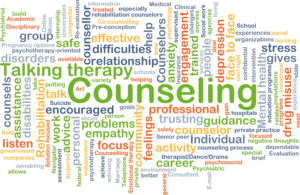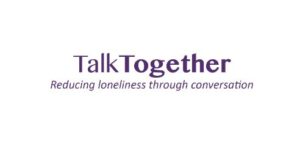Counselling
Counselling is a process that helps people overcome their emotional difficulties and improve their mental health.
It usually happens face to face, between just you and a therapist, but sometimes it can take place in groups, over Skype or by telephone. Counselling sessions are confidential (unless you disclose that you are going to seriously harm someone, or that they are going to seriously harm you).
Find out more here.

What is Counselling?
 Counselling is a talking therapy that helps you explore unwanted thoughts, actions or behaviours that may be making things difficult for you and those around you. In the first few sessions you and your therapist will need to build a relationship and mutual trust. It’s important that you can be honest with the therapist- and yourself- to make sure you can tackle your issues effectively.
Counselling is a talking therapy that helps you explore unwanted thoughts, actions or behaviours that may be making things difficult for you and those around you. In the first few sessions you and your therapist will need to build a relationship and mutual trust. It’s important that you can be honest with the therapist- and yourself- to make sure you can tackle your issues effectively.
A trained therapist will be able to help you verbalise your thoughts and feelings at a pace that’s comfortable for you. An experienced therapist will give you time and space so that you don’t feel pressured to explore areas if you’re not ready to.
How does it work?
Counselling sessions usually last an hour and take place on a weekly basis. You can see your therapist for as long as you feel the sessions are useful. Regular reviews between you and the therapist can be part of the therapy, to help you assess whether you’re making progress and whether this form of therapy works for you. A therapist can also help you explore other options if you feel that you’re not making any progress.
What types of counselling are available?
There are several types of counselling approaches. The most common one, currently, is Cognitive Behavioural Therapy (CBT), used a lot by the NHS. CBT is a shorter-term therapy, between 6 and 20 sessions, to help you explore changes to your behaviour that you can start making now.
Most private therapists are Integrative Therapists. They use several approaches combined to give you the best experience, which might include CBT.
Other approaches that may be used are:
- Psychodynamic Therapy
This therapy focuses on childhood experiences and the influences that may have shaped how you behave now. Experiences in childhood affect how we view the world, and the way we act in it. An experienced therapist takes you through areas of your childhood that seem significant; they may focus on trauma or negative experiences that have become deep routed and formed the thoughts and behaviours that you may no longer need or act on in your adult life. - Person Centred Therapy
This therapy works in the ‘Here and Now’. The therapist gives you all the time you need to think about how things are currently working out for you. They won’t link your past experiences to your current behaviour and there is no direction or treatment plan. Person centred therapists believe you can reach your own problem-solving potential by being listened to unconditionally and positively, without judgement; allowing you to truly experience your own view of the world through talking and thinking. - EMDR (Eye Movement Desensitisation and Reprocessing)
This is a relatively new therapy that was developed to treat PTSD (Post Traumatic Stress Disorder) but is now being more widely used to treat depression and anxiety. EMDR is usually a series of at least 12 sessions that take you through steps to address the problem. They use eye movement and taps or sounds to help you focus on the trauma whilst you recall a memory. Over the series of exercises the expectation is that the distress of this memory will be reduced. - Mindfulness
This is a fast-growing practice in the UK where you can benefit from being totally in the present. It helps you focus purely on this moment, without being judgemental or letting the mind race away with other thoughts. This helps you to really relax and feel what’s going on with your body now without stressful thoughts taking you back to a place that has either passed or forward to something that may or may not happen – reducing stress and anxiety.
What problems can a therapist help me with?
A good therapist can help you work through difficult or painful feelings that have affected your mental health and caused you depression, anxiety or made you unable to have healthy relationships.
Depression and anxiety often make us behave in a way that makes it difficult for us to be around people, or for people to be around us, which can lead to loneliness and /or isolation. We may feel that we don’t have any support or that we’re the only person experiencing this.
Working through these feelings can help you resolve the internal conflicts about who you are, or who you feel you should or shouldn’t be, so that you can live a happier and healthier life.
You might feel that talking through these feelings will make things worse.
In some cases, things do feel worse before they get better and this is perfectly normal. You need to experience the feelings in order to resolve them and doing this with a trained and experienced counsellor gives you reassurance that your feelings are valid and respected. A counsellor will not be judgemental about your experiences or feelings, their whole focus is to help you to feel differently.
How do I find a therapist?
We have a specialist counsellor, Di Stevens, who can answer all your questions, confidentially, and help source the right counsellor for you, and the Trust has secured funding to pay for your first 6 sessions through the new Network of Mental Health Specialists scheme.
If you would like to get in touch with us to help you find a therapist you can call us on 01480 474074 or email us.
You can also visit our web page to find out more about the Trust scheme.
 Diane Stevens, Counsellor
Diane Stevens, Counsellor
Diane Stevens is a qualified counsellor with a wealth of experience in the types of therapy she has described here.
Based in Cambridgeshire and London, and with practices in Peterborough and Harley Street, Diane is ideally placed to help us respond to your emotional wellbeing needs. She will be working with the Trust to recruit a qualified bank of counsellors throughout the UK.
With 20 years’ experience, starting with training in Washington, in the North East, Diane has counselled a wide range of people facing a huge range of issues.
In her spare time, she enjoys catching up with her three daughters, in London, theatre and walking. She loves the company of good friends on holidays in the UK – with a healthy blend of walking, good wine, good food and good conversation.
To get in touch and read more information visit Diane’s website.
How much will it cost?
Counselling fees vary depending on your location and the type of therapy you need.
Several charities offer low cost therapy, and your GP can refer you through the NHS if your area has provision for counselling. However, sometimes waiting lists can be long and you often have to meet specialist criteria depending on where you live.
You can get private therapy much quicker, but it’s important to meet with the right counsellor. Sessions in the UK start from about £50 per session, depending on the counsellors’ experience and expertise. Private counsellors usually have on-line profiles that you can read to help you make your choice, and the Trust is developing a network of trained and experienced counsellors that have been assessed to meet beneficiaries’ needs. After your first 6 sessions funded by the Trust under the scheme, you can use your Health Grant to meet the cost of counselling if you wish to continue.


